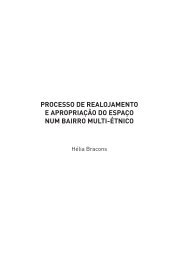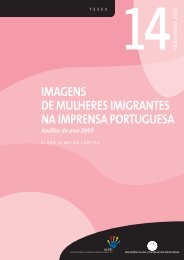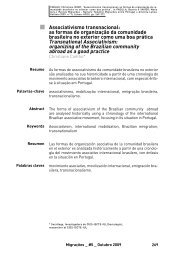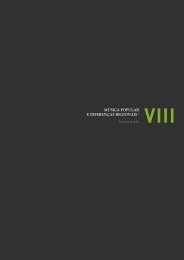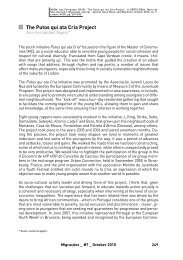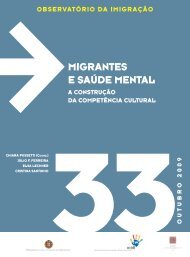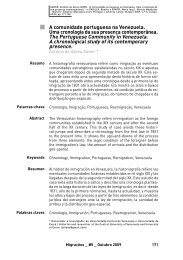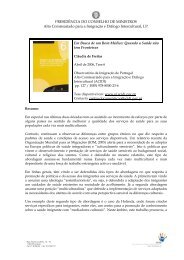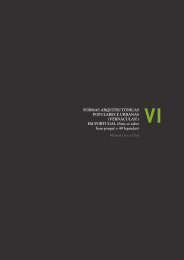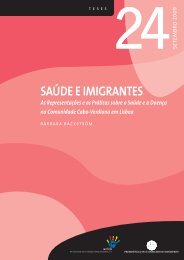Revising citizenship: migration and fado in the play of identities in ...
Revising citizenship: migration and fado in the play of identities in ...
Revising citizenship: migration and fado in the play of identities in ...
You also want an ePaper? Increase the reach of your titles
YUMPU automatically turns print PDFs into web optimized ePapers that Google loves.
mechanistic-determ<strong>in</strong>ist perspective (Fonseca, 2008:16) to what may be called <strong>the</strong>performative-diversifiable perspective <strong>of</strong> <strong>the</strong> character or identity. Us<strong>in</strong>g <strong>the</strong> image<strong>of</strong> Zygmunt Bauman, <strong>the</strong>y were recognis<strong>in</strong>g <strong>the</strong>n, <strong>in</strong> <strong>the</strong>ir <strong>in</strong>terpretation, <strong>the</strong> passage<strong>of</strong> identity, <strong>in</strong> <strong>in</strong>dividual <strong>and</strong> national grounds, from <strong>the</strong> pilgrim phase, previouslydeterm<strong>in</strong>ed, to that <strong>of</strong> <strong>the</strong> tourist <strong>in</strong> an open <strong>and</strong> fluid state (1996). The power <strong>of</strong> presentbody behaviour <strong>in</strong> performance had surpassed that <strong>of</strong> rationalised nationalistmemory. Nationalist reasons were still dom<strong>in</strong>ant <strong>in</strong> <strong>the</strong> <strong>fado</strong> culture <strong>in</strong> <strong>the</strong> migrantcontext, <strong>and</strong> <strong>the</strong> political sides <strong>of</strong> right <strong>and</strong> left w<strong>in</strong>gs prevailed <strong>in</strong> <strong>the</strong>ir m<strong>in</strong>ds.Older than <strong>the</strong> dictatorship <strong>the</strong> music category <strong>of</strong> <strong>fado</strong>, shaped as a national design,fitted extraord<strong>in</strong>arily well <strong>the</strong> nationalist purposes <strong>of</strong> Estado Novo (New State). Strongcircumstantial conditions, like state control, enhanced <strong>the</strong> dictatorial use <strong>of</strong> <strong>fado</strong>: <strong>the</strong>romantic orig<strong>in</strong>, <strong>the</strong> connection with dest<strong>in</strong>y <strong>and</strong> <strong>the</strong> perform<strong>in</strong>g character. Apparentlyborn <strong>in</strong> <strong>the</strong> 19 th century, <strong>in</strong> a time <strong>of</strong> exacerbated nationalist feel<strong>in</strong>gs, it was consistentlyconstructed out <strong>of</strong> a number <strong>of</strong> features that served well <strong>the</strong> also nationalist proposals<strong>of</strong> <strong>the</strong> dictatorship. Its conspicuousness <strong>in</strong> worship<strong>in</strong>g past times <strong>and</strong> homel<strong>and</strong>virtues, giv<strong>in</strong>g voice to <strong>the</strong> people, lean<strong>in</strong>g on unrequited love <strong>of</strong> different sorts, nurturednostalgic feel<strong>in</strong>gs such as sorrow <strong>and</strong> yearn<strong>in</strong>g. The latter serv<strong>in</strong>g so well <strong>the</strong> contemporarymystic <strong>of</strong> saudade, one <strong>of</strong> <strong>the</strong> virtual images <strong>of</strong> <strong>the</strong> complex affective nodePortuguese people have constructed about <strong>the</strong>mselves through time (Moreira de Sá,nd:1), was shaped not only <strong>in</strong> music but also <strong>in</strong> literature, <strong>the</strong>atre, film <strong>and</strong> o<strong>the</strong>r artworks, produc<strong>in</strong>g multiple referential connections for later symbolic <strong>in</strong>terpretation.The dest<strong>in</strong>y or fate <strong>in</strong> <strong>the</strong> name, acted as an exceptionally strong representation <strong>in</strong>a <strong>the</strong>n mostly illiterate country dom<strong>in</strong>ated by religious faith <strong>and</strong> fears <strong>of</strong> Roman Catholic<strong>in</strong>spiration. F<strong>in</strong>ally, its perform<strong>in</strong>g character giv<strong>in</strong>g voice to <strong>in</strong>timate feel<strong>in</strong>gs <strong>of</strong>many sorts, comb<strong>in</strong>ed with <strong>the</strong> previous conditions, made <strong>fado</strong> an extremely efficientchannel to l<strong>in</strong>k <strong>in</strong>dividual <strong>identities</strong> to <strong>the</strong> national conscience constructed.Concerted actions <strong>and</strong> strategies <strong>of</strong> dictatorial <strong>in</strong>itiative, adapt<strong>in</strong>g <strong>fado</strong> to its purposes<strong>in</strong>cluded stripp<strong>in</strong>g <strong>the</strong> lyrics <strong>of</strong> any possible k<strong>in</strong>ds <strong>of</strong> critical feel<strong>in</strong>gs, through means<strong>of</strong> censorship; promot<strong>in</strong>g <strong>the</strong> taste for <strong>fado</strong>, jo<strong>in</strong><strong>in</strong>g <strong>the</strong> leader, Salazar, <strong>in</strong> its advocacy,through <strong>in</strong>formation as to his preference <strong>and</strong> proximity to it (Garnier, 1952); <strong>and</strong>mak<strong>in</strong>g it a privileged means for national propag<strong>and</strong>a through <strong>the</strong> re<strong>in</strong>forcement <strong>of</strong><strong>the</strong> music category <strong>in</strong> <strong>the</strong> enterta<strong>in</strong>ment <strong>in</strong>dustry (radio, record<strong>in</strong>gs, journals, c<strong>in</strong>ema,music <strong>the</strong>atre, restaurants for tourists <strong>and</strong> <strong>in</strong>ternational diplomatic enterta<strong>in</strong>ment<strong>and</strong> representation). The great diva Amália Rodrigues stressed her own forcedma<strong>in</strong>tenance <strong>in</strong> <strong>fado</strong> activity by what she verbalized as “…[<strong>the</strong>y] wanted me for <strong>fado</strong>”,leav<strong>in</strong>g unsaid whom. She was <strong>the</strong>n mention<strong>in</strong>g <strong>the</strong> power <strong>of</strong> <strong>the</strong> nation, leav<strong>in</strong>g openwho “wanted” her for that: precise government agents? Ambivalent forces? People’swill channelled through nationalist means? (personal <strong>in</strong>terview, Lisbon, 28.08.1990,<strong>in</strong> Côrte-Real, 2005).Even <strong>the</strong> stress on <strong>the</strong> m<strong>in</strong>or tonality associated with <strong>fado</strong>, <strong>and</strong> <strong>the</strong> prevalence <strong>of</strong><strong>the</strong> image <strong>of</strong> <strong>the</strong> <strong>fado</strong> menor category/music pattern was object <strong>of</strong> governmental action.Processed, among o<strong>the</strong>r means, through consecutive <strong>fado</strong> contests <strong>of</strong> nationalscope,<strong>in</strong>volv<strong>in</strong>g most if not all licensed <strong>fado</strong> houses, <strong>in</strong> <strong>the</strong> so called April Festivities(Côrte-Real, 2000, 2002 <strong>and</strong> 2008). For tourist propag<strong>and</strong>a, <strong>the</strong>se events happened84 Music <strong>and</strong> Migration



